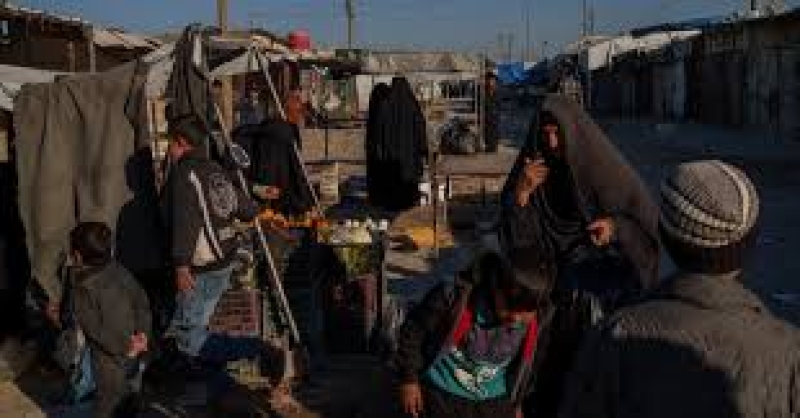- Pak edge Lanka in high-scoring thriller: Both out of T20 World Cup |
- Trump says US aims to destroy Iran's military, topple government |
- Stock indices rally at DSE, CSE despite shrinking turnover |
- Tehran hits back across region after US and Israel attack Iran |
- African Union calls for restraint in Middle East |
Aid freeze deepens crisis at Syria’s Al-Hol camp

Ahmad Abdullah Hammoud had to rely on stored food to sustain his family after a U.S.-funded aid organization suddenly halted operations at the overcrowded al-Hol camp in northeastern Syria.
The camp, home to 37,000 people—mostly women and children with suspected links to the Islamic State group—faced worsening conditions when the Trump administration froze foreign aid. The abrupt decision disrupted essential services, including food, water, and fuel distribution, causing panic and uncertainty.
Blumont, the U.S.-based aid group managing key operations at the camp, briefly suspended its activities before resuming under a temporary waiver. However, uncertainty looms as the waiver is set to expire soon.
The commander of the U.S.-backed Syrian Democratic Forces (SDF), Mazloum Abdi, has been in talks with U.S. officials, seeking an exemption for the region. Concerns grow that prolonged aid cuts could spark unrest in the camp, where IS sleeper cells remain active, reports UNB.
With security fears mounting and living conditions deteriorating, camp director Jihan Hanan warns that the crisis could escalate if U.S. assistance is permanently halted.
It had been providing essentials such as bread, water, kerosene and cooking gas. Blumont didn't reply to questions.
“We were troubled when Blumont suspended its activities," said Hammoud, who denies links with IS and had been sheltering in an IS-controlled area after being displaced during Syria's civil war.
“Believe me, we did not find food. Even bread only came at 2 p.m,” said another camp resident, Dirar al-Ali.
Camp director Jihan Hanan told The Associated Press that other aid agencies, including the World Health Organization, had ceased some operations.
“It is a disgraceful decision,” Hanan said of the Trump administration's action, adding that some residents argued they should be allowed to leave if food cannot be provided.
She said Blumont distributes 5,000 bags of bread daily at a cost of about $4,000, something that local authorities in the Kurdish-run enclave cannot afford.
Uncertain times ahead
Hanan said Blumont received a two-week waiver from the Trump administration and resumed work on Jan. 28. It is not clear what will happen once the waiver ends.
Mazloum Abdi, the commander of the U.S.-backed Syrian Democratic Forces that control northeastern Syria, said he has raised the aid freeze issue with officials from the U.S.-led coalition.
“We are on the verge of finding an alternative to this decision,” Abdi said, adding that an exemption might be issued for northeastern Syria.
The U.S. freeze comes as IS tries to take advantage of the vacuum created by the fall of Assad’s government in early December to insurgents. Another cut in food supplies could lead to riots by camp residents that IS, which has sleeper cells there, could exploit.
Hanan said the camp had received information from the U.S.-led coalition against IS, the Iraqi government and the U.S.-backed and Kurdish-led SDF, that IS was preparing to attack the camp after Assad’s fall. Security was increased and the situation is under control, she said.
The SDF runs 28 detention facilities in northeastern Syria holding some 9,000 IS members. Security at al-Hol camp and the detention facilities are not expected to be affected by the U.S. aid freeze, according to Hanan and an official at the largest detention facility in the northeastern city of Hassakeh, who spoke on condition of anonymity in line with regulations.
The main part of al-Hol houses some 16,000 Iraqis and 15,000 Syrians. In a separate, heavily guarded section known as the Annex are another 6,300 people from 42 countries, the vast majority of them wives, widows and children who are considered the most die-hard IS supporters.
The camp has no paved roads and piles of trash. Teenagers and children with almost nothing to do spend their time playing soccer or wandering around.
Children in the Annex threw stones at visiting AP journalists and shouted “You are a Satan" and “The Islamic State is lasting.”
'Sustenance is from God'
A Chinese woman in the Annex, who identified herself as Asmaa Ahmad and said she came from the western region of Xinjiang, described her husband as “an Islamic State martyr” killed in 2019 in the eastern Syrian village of Baghouz, where IS lost the last sliver of land it once controlled.
Ahmad, who is in the camp with her four children, said she does not want to go back to China, fearing persecution. Asked about the temporary loss of U.S. aid, she replied: “Sustenance is from God.”
She said she is waiting for IS members to rescue her family one day.
Al-Hol is the most dangerous place in the world, camp director Hanan asserted, adding that countries should repatriate their citizens to prevent children being fed the extremist ideology. “This place is not suitable for children,” she said.
The U.S. military has been pushing for years for countries who have citizens at al-Hol and the smaller, separate Roj Camp to repatriate them.
“Without international repatriation, rehabilitation and reintegration efforts, these camps risk creating the next generation of ISIS,” Gen. Michael Erik Kurilla, head of U.S. Central Command, said during a visit to al-Hol in mid-January.
Hanan said that since the fall of Assad, many Syrians in the camp have expressed a desire to return to their homes in areas held by the country’s new rulers. She said camp authorities decided that any Syrian who wants to leave can go.
Even if the camp population drops, “there will be a disaster" if U.S. aid is suspended again, she added.

